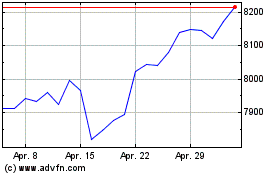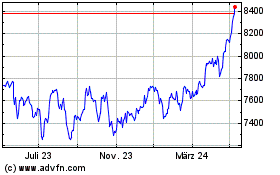By Gunjan Banerji, Avantika Chilkoti and Stuart Condie
The technology heavyweights that powered the recent market
rebound stumbled Friday, dragging down the broader stock
market.
A busy week of corporate earnings and economic data drove big
stock swings in recent days as investors parsed a flood of
information highlighting the intense toll of the coronavirus
pandemic on the economy.
One of the biggest warning signs for investors: the tech giants
that appeared almost untouchable even during a global pandemic
showed signs of faltering as their quarterly results streamed
in.
Amazon.com posted record revenue late Thursday but disappointed
on profits as coronavirus-related costs such as employee testing
and higher wages added to expenses. Lawmakers have also called on
Chief Executive Jeff Bezos to testify on the company's
private-label practices. A Wall Street Journal investigation found
the company's employees used data about independent sellers on its
platform to develop products.
Apple, meanwhile, held off providing guidance for the current
quarter for the first time since late 2003.
"It's a warning shot across the bow that no company is immune
from this even if you're able to raise your top-line revenues,"
said Brian O'Reilly, head of market strategy for Mediolanum
International Funds.
Major U.S. indexes fell for the second consecutive week. The
S&P 500 dropped 81.72 points, or 2.8% to 2830.71 on Friday as
losses accelerated midday. The Dow Jones Industrial Average shed
622.03 points, or 2.6% to 23723.69. The tech-heavy Nasdaq Composite
lost 284.60 points, or 3.2%, to 8604.95, lagging behind its peers
after outperforming in recent weeks.
All three indexes fell less than 0.5% for the week.
Adding to the sting, tech heavyweights have led markets higher
in recent weeks, helping major indexes recover from their March
lows and pushing them toward historic gains in April. Shares of
Amazon fell $187.96, or 7.6%, to $2286.04 on Friday. Apple shares
slipped $4.73, or 1.6%, to $289.07.
U.S. stock benchmarks clocked their largest percentage gains
since 1987 last month, with the S&P 500 up 13% and the Dow
Jones Industrial Average gaining 11%.
Highlighting the peculiar market environment of in recent weeks,
as U.S. stocks finished April with big gains, other economic data
this week revealed the distressing impact of the coronavirus across
the country.
Consumer spending, the U.S. economy's key driver, posted its
biggest monthly decline on record in March. Meanwhile, the U.S.
economy shrank in the first quarter at its fastest pace since the
last recession. On Friday, fresh data showed U.S. manufacturing
contracting.
Several investors said the latest releases highlighted the
mammoth challenge that lawmakers and policy makers face in getting
the domestic economy back on a strong footing.
"For people that would be considering investing, it was a
reality check, " said Don Dale, managing partner at investment firm
Equity Risk Control Group.
Earlier in the week, the Federal Reserve warned of greater
economic deterioration ahead but said it would use its tools to
support the economy.
Additionally, there are concerns that an economic recovery could
take longer than many have been expecting. Data released in coming
weeks would likely be as bad, or worse, analysts said.
"We're going to get these constant reminders that the economy is
suffering," said Adam Phillips, director of portfolio strategy at
EP Wealth Advisors. "It serves as a much-needed wake-up call for
the entire stock market."
Next week, for example, investors will be watching the monthly
jobs report, after recent data showed that millions of Americans
have filed for unemployment benefits.
Adding to investors' jitters Friday were concerns about fresh
tensions between the U.S. and China. In an unusual public
statement, a U.S. intelligence agency said Thursday that it was
investigating whether the coronavirus may have escaped from a
laboratory in Wuhan, China.
"The important thing for investors is that these tensions around
trade, these tensions around technology and technology transfers,
and tensions around geopolitics more broadly, these issues are
going to persist and maybe even heighten as we go forward," said
Joseph Little, chief global strategist at HSBC Global Asset
Management.
Corporate earnings news drove swings in individual stocks.
Shares of Exxon Mobil and Chevron dropped after the companies
reported a drop in demand on the back of shelter-in-place rules.
The energy companies also said they would both cut back capital
spending plans for 2020. Exxon fell $3.33, or 7.2%, to $43.14,
while Chevron edged down $2.56, or 2.8%, to $89.44.
Shares of Tesla plunged after Chief Executive Elon Musk tweeted
that the auto maker's share price was "too high." Tesla stock
dropped $80.56, or 10.3% to $701.32. Still, the shares are sitting
on gains of almost 70% this year.
Clorox shares added $6.27, or 3.4%, to $192.71 after the
household-supplies producer issued more optimistic guidance on
higher demand for cleaning supplies.
Brent crude, the global oil benchmark, slipped Friday but rose
6.6% this week to settle at $26.44 a barrel, snapping a three-week
losing streak marked by huge swings. Analysts expect demand for
fuel to rise as lockdown rules are gradually lifted and supply
eases as output cuts agreed by the Organization of the Petroleum
Exporting Countries come through.
The U.K.'s FTSE 100 dropped 2.3%. Japan's Nikkei 225 closed down
2.8% and Australia's S&P/ASX 200 ended 5% lower. Markets in
China, Hong Kong and across most of Europe were closed for the May
Day holiday.
Write to Gunjan Banerji at Gunjan.Banerji@wsj.com and Avantika
Chilkoti at Avantika.Chilkoti@wsj.com
(END) Dow Jones Newswires
May 01, 2020 17:13 ET (21:13 GMT)
Copyright (c) 2020 Dow Jones & Company, Inc.
FTSE 100
Index Chart
Von Mär 2024 bis Apr 2024

FTSE 100
Index Chart
Von Apr 2023 bis Apr 2024
